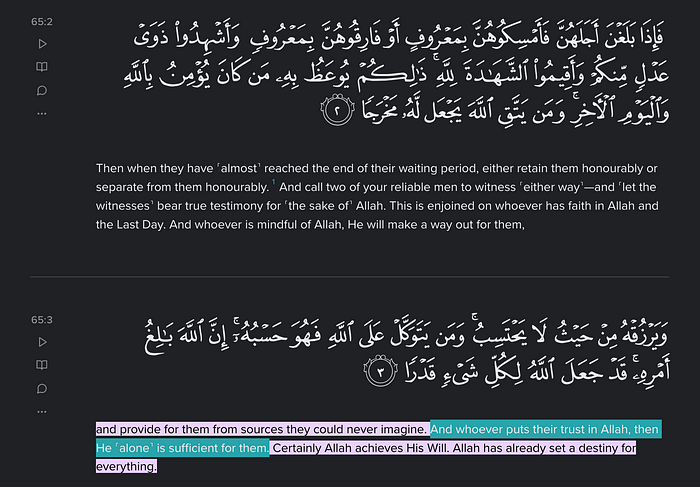Ya muqollibal qulub…
Ever felt like you are juggling the need to hustle with just letting things be? That has been my journey with Ikhtiar and Tawakkal. Ikhtiar is about rolling up your sleeves and getting things done, but Tawakkal? It is about stepping back and trusting the flow of life.
I have learned it is not just about doing; it is also about being okay with the outcome, however unexpected.
Also, it is about understanding that not everything is in my hands. Some things, no matter how hard I try, are just beyond my control — and that’s okay :)
The Ikhitar Threshold
Talking about what’s in our control makes me think of Stephen Covey’s idea of proactivity from his book, ‘The 7 Habits of Highly Effective People.’ He explains that proactivity is not just about jumping into action, but more about how we choose to respond to what life throws at us. This idea fits perfectly with what I like to call the ‘Ikhtiar threshold’ — that spot where our efforts meet a power to actually make a difference.
It sounds like figuring out where we can leave our mark and where we need to step back and let things be. It is about being mindful of where our actions count the most, not just rushing in to change everything.
This is where Covey’s ‘Circle of Influence’ and ‘Circle of Concern’ come into my mind. The Circle of Concern includes all the things we worry about — from big world issues to personal problems, but many of these are beyond our control. Then there is the Circle of Influence — the stuff we can actually do something about. It is smaller, sure, but it is where we have real power.
When we focus on this Circle of Influence, like really putting our energy into what we can change, it tends to grow. We become more effective and more proactive — the productivity boost.

This slaps me right on my face, I am currently doing my undergraduate final thesis and I think my biggest mistake is focusing too much on the circle of concern. I tend to use a reactive focus (which I don't know why) instead of a proactive one. I might say that the current problem really resonates with my concern and I am super energized to change the status quo — which I cannot do (of course, in the short run). I need to keep saying “Stop doing this, focus on what you can do NOW” over and over again, re-learning the proactive focus that I thought I already understood.
But, then, what? I feel guilty if I cannot do anything about a problem that I noticed. It felt uneasy to only do the bare minimum. I feel restless to know I could do something MORE but I need more time to solve the problem.
Well, it means, that something more might not my destiny to pursue. It might be the others’, and hey, did you remember that you always know what to do when it is time to step back and let things go their way? where sometimes, it depends on the other people.
The Art of Tawakkal
I would emphasize the two most important factors in practicing Tawakkal: effort, and trust. The effort, or Ikhtiar, is about doing my part to the best of my ability, putting in the necessary work, and making informed choices. Trust, on the other hand, is about understanding and accepting that the outcomes are not always in my control.
Once I have done everything I can, trusting in Allah involves letting go of my attachment to specific results and believing that whatever happens is for the best, even if it’s not immediately clear. This combination of proactive effort and trusting surrender is not just a practice but a way of life, guiding me through times of uncertainty and helping me find peace in the knowledge that I have done my part, and the rest is in the hands of a higher power.

Sometimes, my journeys are intertwined with others, and outcomes hinge on actions beyond my own. In these moments, the phrase ‘Ya muqollibal qulub,’ or ‘Allah is the Turner of Hearts,’ resonates deeply.
It is a powerful acknowledgment of my limited ability to control situations, especially those involving other people’s thoughts and actions. I ask for our hearts to be aligned with patience, resilience, and understanding, recognizing that these internal shifts can have a significant impact on how we navigate life’s complexities.
‘Ya muqollibal qulub’ is more than a plea for guidance; it’s an active engagement in spiritual practice, a way of influencing life’s course through faith. It underscores our human efforts with a deeper layer of spiritual reliance, harmonizing our actions with the divine will.
Reflecting on this, I recognize that Allah’s wisdom in guiding our hearts is infinite. Our desires, our efforts, and our paths are all under His divine orchestration. This realization is not about surrendering our ambitions, but rather about acknowledging a greater plan at play, one that we might not fully comprehend.
Endnote
Applying this to daily life is like walking a tightrope. On one side, there’s Ikhtiar — setting goals and chasing dreams. But then there’s Tawakkal — the art of letting go. It is about doing your best, then, taking a deep breath and letting the universe take over. This will help to lower stress about the ‘what ifs’ and ‘should haves.’
Striking a balance between these two has been a real eye-opener. Lean too much into Ikhtiar, and you’re a ball of stress. Too much Tawakkal and you might just end up on your couch, waiting for things to happen. It is about finding that balance — where effort meets faith.
